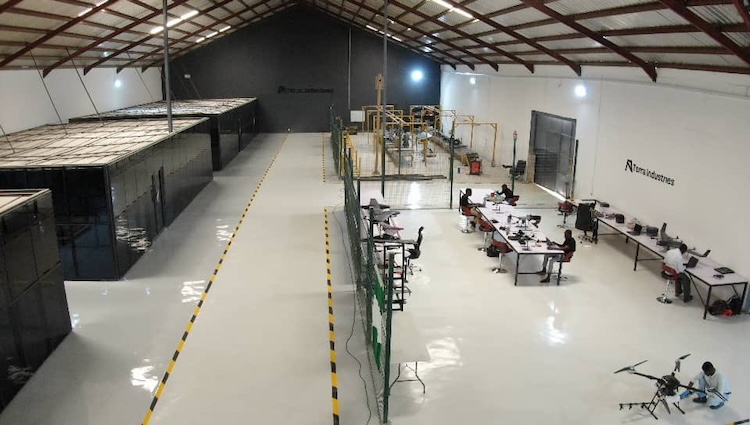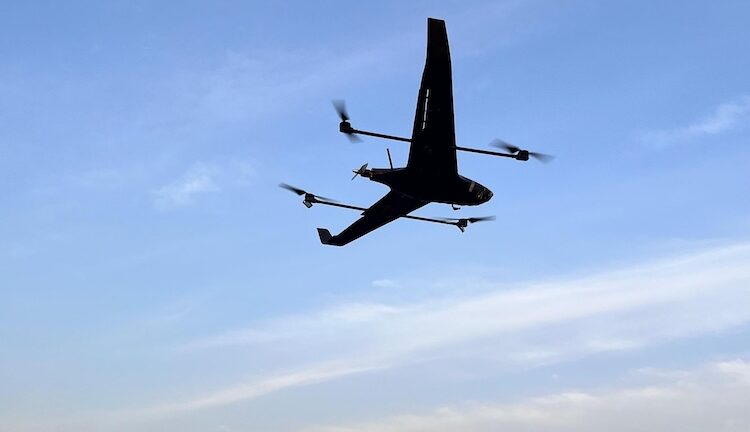By Ramesh Jaura
This article was first published on https://rjaura.substack.com/
BERLIN, ABUJA (Nigeria) | 8 August 2025 (IDN) — In a nondescript hangar on the edge of Nigeria’s capital, engineers in Terra Industries uniforms are assembling sleek, black UAVs—machines that could redefine how Africa protects its lifelines. These aren’t weapons of war. They’re first responders, guarding hydroelectric plants, pipelines, and mines in one of the world’s most under-protected yet fastest-growing continents.
Born just over a year ago as TerraHaptix, Terra Industries is Africa’s first serious contender in the high-stakes domain of autonomous infrastructure security. Armed with its line of drones, surveillance towers, and proprietary software, the Nigerian startup is breaking new ground—and breaking the mould.
In June, Terra pulled off a feat few thought possible: it beat out an Israeli security consortium to win a $1.2 million contract to guard two hydroelectric plants in Nigeria. Its solution was leaner, smarter, and—critically—local.
“We’re proving that Africans can build for Africa,” says co-founder and CEO Dayo Akinyemi. “No one knows our terrain, our challenges, our urgency better than we do.”
With over $6 billion worth of critical infrastructure under protection, Terra is at the centre of an African autonomy revolution—one that could upend global assumptions about who leads in defence, infrastructure, and high tech.
A New Kind of Security for a New Africa
Africa loses billions annually to infrastructure sabotage—vandalised pipelines, stolen transmission lines, and bandit raids on remote mining sites. Traditionally, governments and firms outsourced protection to Western contractors, private militaries, or imported surveillance gear from China and Israel.
Terra offers an alternative: fully autonomous, locally manufactured drone and sensor systems built at its facility in Abuja, where workers churn out up to 20 units a day.
Its flagship drone, the Iroko, is named after the towering West African hardwood—a symbol of resilience. Equipped with thermal sensors, high-definition cameras, and real-time connectivity to Terra’s ArtemisOS software platform, each Iroko can respond autonomously to perimeter breaches, track intruders, or even relay video to clients hundreds of miles away.
In the hydroelectric contract, Terra deployed over a dozen drones and 35 surveillance towers to protect a pair of power plants serving millions of people. “Our towers see what eyes miss. Our drones go where boots can’t,” Akinyemi says.
Beyond the Battlefield
Terra is not a weapons manufacturer. Its focus is what it calls “civilian autonomy for infrastructure security.”
“We’re not in the combat drone race,” says technical director Ifeoma Egwuatu. “We don’t do missiles or kill switches. Our systems are about protection, prevention, and peace.”
That distinction matters. As lethal autonomous weapons stir global concern, Terra’s model embraces ethical AI—a software-first, defensive architecture designed to complement, not replace, human oversight.
Yet the strategic implications are unmistakable.
“The ability to protect infrastructure autonomously is a form of sovereignty,” says Emmanuel Gyimah, a Ghanaian security analyst. “Terra is doing what African states have long struggled to do: monitor vast territories with limited personnel. That’s geopolitical power.”
A Win for Local Innovation
Apps and fintech often define the African tech landscape. Terra signals something different: hard tech born and built in Africa—drones, towers, autonomous systems, manufactured and deployed at scale.
The implications are transformative:
- Economic security: Infrastructure uptime means fewer blackouts, lower costs, and greater investor confidence.
- Local value chains: Terra’s Abuja facility employs engineers, software developers, and technicians who might otherwise seek jobs abroad.
- Cost competitiveness: Terra reportedly offers protection systems at 20–30% lower cost than foreign firms—tailored to African terrain and constraints.
In Nigeria, Ghana, Kenya, and Mozambique—where Terra already operates—governments are taking note.
“There’s now an indigenous alternative to foreign dependency,” says Kenya’s national energy adviser, Miriam Otieno. “It’s a game-changer.”

Autonomy Meets Opportunity
At the heart of Terra’s technology is ArtemisOS, a proprietary autonomy platform that syncs drones, cameras, motion sensors, and client software into a single operating system. It’s not just hardware that matters—but what ties it all together.
That integration is what allowed Terra to retrofit ageing Nigerian hydro plants—built in the 1980s—with modern security automation in a matter of weeks.
Looking ahead, ArtemisOS could emerge as a software-as-a-service (SaaS) product, with export potential well beyond Africa. “It’s scalable, modular, and cloud-ready,” says Egwuatu. “From oil rigs in Angola to telecom towers in Rwanda—we can secure them all.”
Challenges in the Flight Path
Still, Terra’s ascent is far from guaranteed.
African drone regulations remain inconsistent. Some countries—like South Africa and Rwanda—have clear frameworks. Others lag, complicating cross-border operations.
Meanwhile, competition looms. Global defence and surveillance giants aren’t blind to Terra’s rise. As contracts grow, so will pressure—political, commercial, and technological.
And then there’s the capital challenge. Scaling from a $1 million contract to protecting hundreds of billions in assets requires financing, trust, and flawless execution. Terra’s backers remain mostly undisclosed, though it has hinted at seeking pan-African investment and potential partnerships in the Middle East.
Not Just an African Story
Terra’s emergence comes amid growing global interest in Africa—not just as a market, but as a maker.
Washington, Brussels, and Beijing have all launched initiatives to support African tech innovation. But so far, few African companies have claimed space in the “hard autonomy” sector.
“Terra is doing something remarkable,” says Moira Watkins, a fellow at the Brookings Institution. “They’re moving Africa up the tech value chain—out of the role of recipient, into the role of creator. That’s geopolitically significant.”
And it’s happening not in Silicon Valley, but in Abuja.
The Bigger Picture
For the U.S. and other global powers, Terra’s trajectory presents both opportunity and challenge.
- Opportunity: Partnering with African-built autonomy systems can reduce reliance on Chinese or Russian surveillance tech, particularly in sensitive sectors like energy and data.
- Challenge: As African tech capacity grows, Washington must reckon with a multipolar innovation landscape where leadership comes from Lagos, not just Los Angeles.
“There’s no doubt: we’re going to see a lot more Terras,” says Gyimah, the analyst. “Africa is not the testing ground. It’s the launchpad.”
A Drone, a Dream, a New Direction
Back at the Abuja factory, an Iroko drone whirs to life under a technician’s final check. Sleek. Silent. Unarmed—but powerful.
It’s a symbol of a changing continent, where the future isn’t imported. It’s engineered, assembled, and flown—right here.
“We’re not trying to impress Silicon Valley,” Akinyemi says. “We’re trying to secure Africa. And we’re just getting started.” [IDN-InDepthNews]
Original link: https://rjaura.substack.com/p/africas-drone-vanguard-beats-global
https://www.world-view.net/africas-drone-vanguard-beats-global-competitors/
Image: Iroko is a modular, mass-producible quadcopter drone purpose-built for first response and data collection. Source: Terra Industries.


